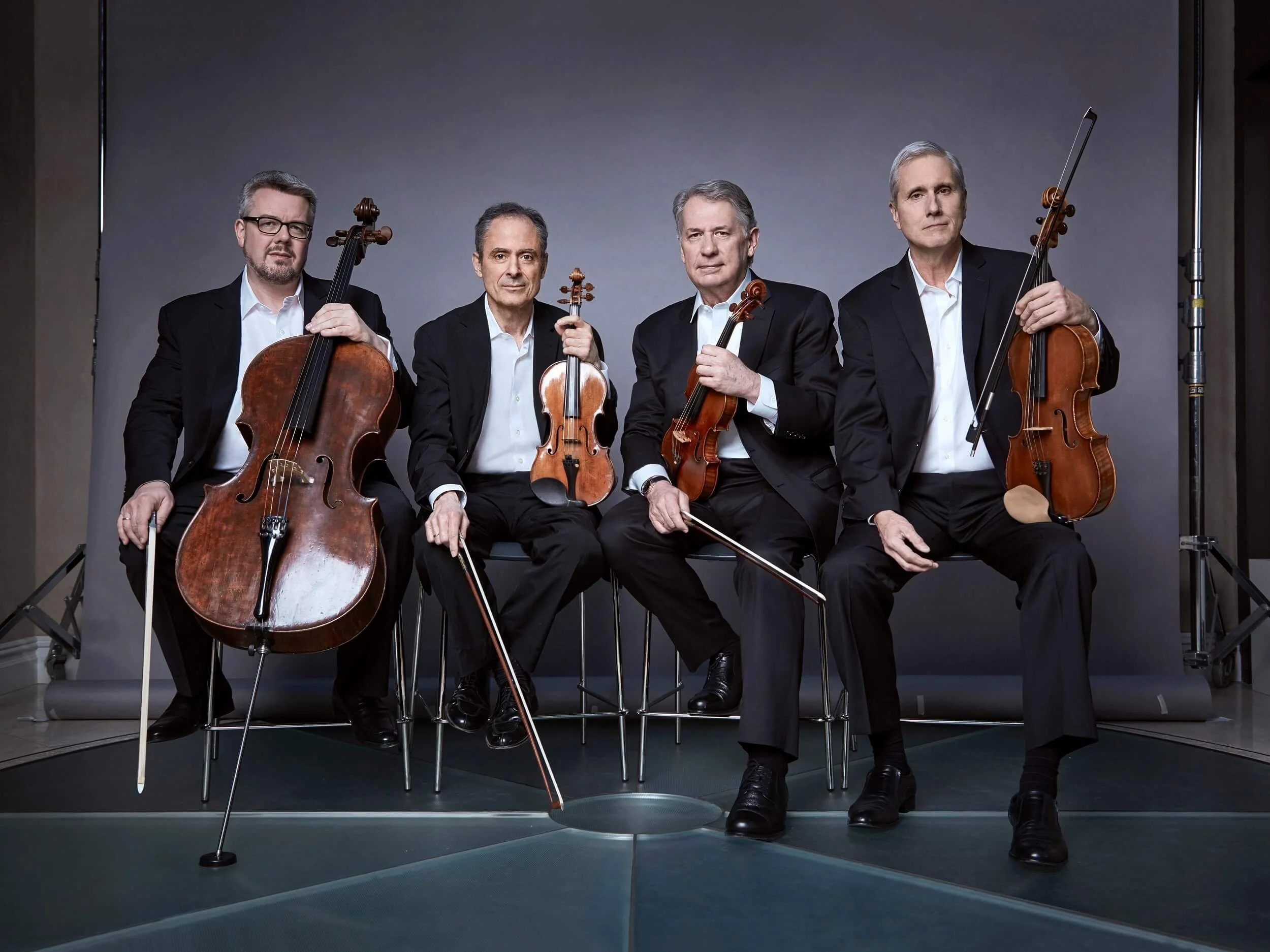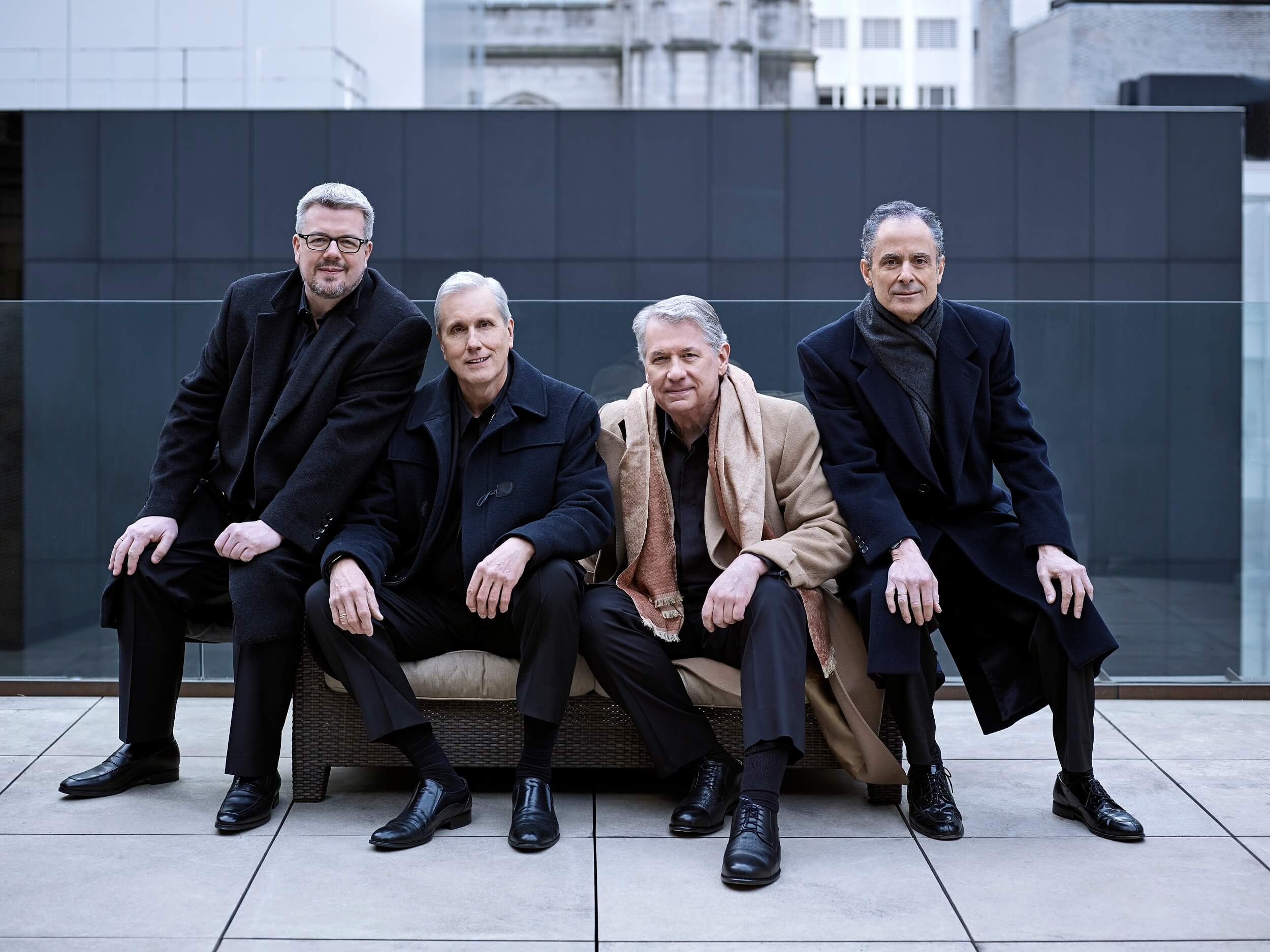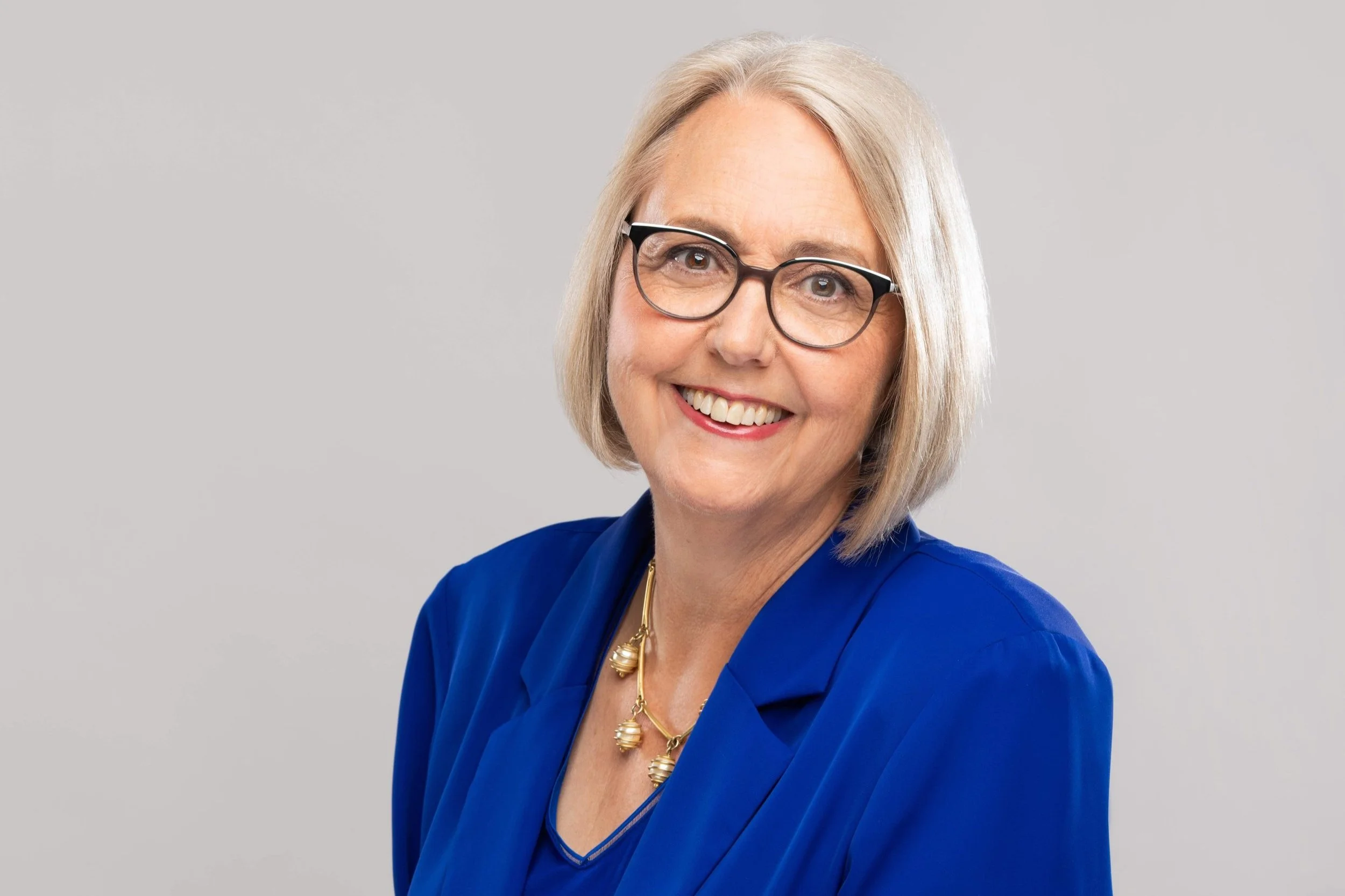New York’s Emerson String Quartet brings some hope for humanity to Vancouver
The acclaimed ensemble performs a potent mixed program before its 2023 grand finale
Emerson String Quartet: Paul Watkins, Eugene Drucker, Philip Setzer, and Paul Watkins.
Friends of Chamber Music presents Emerson String Quartet on May 8 at 3 pm at the Vancouver Playhouse
TIME MAGAZINE ONCE called New York’s Emerson String Quartet “America's greatest quartet”. The Times of London wrote of the nine-time Grammy-winning group: “With musicians like this, there must be some hope for humanity.” Since its founding at the Juilliard School in 1976, the ensemble has received the highest of praise in the form of numerous other honours, such as the Richard J. Bogomolny National Service Award, Chamber Music America’s highest honour, and Musical America’s coveted Ensemble of the Year award. Then there are some 30 acclaimed recordings and three Gramophone awards. What do you do, Stir asks violinist/co-founding member Eugene Drucker, when you’ve been at the top of Everest for so long?
“You fall off,” he says with a laugh. The artist is joking, of course, but the autumn of 2023 will mark the grand finale of the celebrated group, which comes to Vancouver May 8. The quartet’s disbanding hardly means retirement, however. All four members—Drucker, violinist Philip Setzer, cellist Paul Watkins, and violist Paul Watkins—will continue to perform and teach individually, and they’ll likely find themselves on stage together in various configurations. As a group, they plan to continue mentoring young ensembles through the Emerson String Quartet Institute at Stony Brook University. The State University of New York has awarded Setzer and Dutton the status of distinguished professor, and given the title of honorary distinguished professor to part-time faculty members Drucker and Watkins. Drucker, who also studied comparative literature, has written two novels (2007’s The Savior and 2021’s Yearning) and is penning a third. There are other projects in the works once the ensemble plays its final performance.
“It involves complicated feelings as the time approaches,” Drucker says of the decision to disband. “But it just felt, ultimately among the four of us, it was time to do that. We are concerned about our legacy in terms of what we can pass onto younger musicians. We are very grateful to have a large discography, but we want to add another one or two CDs. We felt that we wanted to end on a high note, so to speak.”
Taking its name from the American poet and philosopher Ralph Waldo Emerson, the quartet was one of the first to have its violinists alternate in the first chair position. Drucker came to music naturally: his father was a professional violinist with the Metropolitan Opera Orchestra in New York, while his mother played piano. After so many years performing, he remains enthralled by the power of live performance.
“What it’s like for me when things are going well is a total connection,” Drucker says. “If it’s very sad music, tears will come to my eyes—like the ‘Cavatina’ from [Beethoven’s] Opus 130—at other times, there’s just the joyous aspect and the kinetic involvement playing something that totally galvanizes you physically through the sheer force of its rhythmic verve and drive—I’ve experienced that certainly with Shostakovich, with Bartók quartets, and with Beethoven….There are these wonderful moments where I feel like it’s me up there playing but I also feel simply like a conduit for the music, for its power, and I hope that sometimes I’m able to do justice to it. And that’s a gratifying feeling.”
A note on the music of Shostakovich, which the ensemble recently performed in the UK as it has many times over the years: the testament that the Russian artist left the world seems more relevant than ever, Drucker says, referring to comments he made at the March performances at London’s Southbank Centre. He said at the concert: “We are horrified by the utter disregard for human life that is now on display as Russia carries out its aggression against the Ukrainian people. We are amazed by the courage of huge numbers of people on both sides of the conflict — the undaunted mettle of the outnumbered, outgunned Ukrainian army and citizen conscripts as well as the Russian demonstrators who are willing to risk arrest and long prison terms so that they can register their protest against the unhinged policy that their leaders are pursuing. It would seem tone deaf to us to perform the entire cycle of Shostakovich’s quartets, which are monumental in purely musical terms but also revelatory if considered in their historical and political context, without mentioning the current war. Shostakovich spoke, often elliptically, through his music; he was rarely if ever able to express himself freely in his public pronouncements. We in the West have the luxury of unconstrained discourse; we plead not only for a rapid end to this war, but also for democratic nations both near and far from Ukraine to open their borders to the flood of refugees, to support them as much as possible, and to welcome emigrés from Russia as well, knowing that many of them do not want the blood of their Ukrainian cousins on their hands. In our anguish over the loss of human life and the devastation of a country that is being brutally punished for its democratic aspirations, we can at least turn to the power, depth and eloquence of Shostakovich’s music in search of solace and meaning.”
Emerson String Quartet.
In Vancouver, the ensemble will perform Bartók’s String Quartet No.1 in A minor, Opus 1, Sz40; Mozart’s String Quartet No.22 in B-flat major, K589; and Beethoven’s String Quartet No.15 in A minor, Opus 132.
Bartók was 27 years old when he wrote his first quartet, and in many ways the piece foreshadows the passionate nature of his work with folk music, says Drucker, noting that the technically demanding piece shifts from elegiac and introspective to vigorous and even ecstatic at certain points. “It’s a privilege to play something like that, which is so involving physically and kinetically that you just start to feel the rhythm in your body.”
The Mozart quartet was one of the legend’s last three, written for the king of Prussia, who was said to be a fine amateur cellist. “There’s such elegant beauty and perfection in the writing,” Drucker says. “It’s always a challenge when you play Mozart, because you want to do justice to that transparency and you don’t want to violate the style by playing too hard. You don’t want to feel inhibited, either, so you want to find that sweet spot between overplaying and underplaying. You want to express yourself freely and find the lyricism in it, you want tonal beauty, and you want to dig in where required.”
Beethoven’s Opus 132, a pillar of Western art music, was written at a time in his life when he was profoundly deaf and exploring new creative pathways as a result. “The deafness which he struggled against mightily…freed him to explore music that might not have been possible if he was still hearing. He took risks. He was always a risk-taker, he was always an outlier, ready to push boundaries to an extreme. This became even more pronounced in his late music.” Drucker describes the third movement, “Heiliger Dankgesang”, which was written as thanks to God following recovery from a long illness, as the work’s centrepiece. The composition as a whole alternates between otherworldly and earthy, ethereal, as if evoking a state halfway between life and death, with a disturbingly intense finale.
“The quiet that we hear when we perform that third movement, the quiet that prevails in the hall, is remarkable; there’s this sort of aura of the final chords when it fades out into silence,” Drucker says. “Then there’s the quality of the silence itself; you almost can’t hear the boundary between sounds and silence. That is very gratifying.
“Even though it’s physically tiring to play that movement—sustaining those long bow strokes and trying to keep the vibrato going, it takes a certain amount of stamina—it doesn’t matter to me if my back aches a little bit at that point because it’s worth it to feel transported like that,” he says. “We hope each time that some or most of the audience might have come along with us.”















